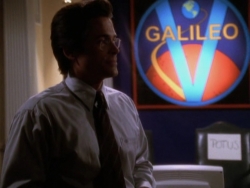IF anyone was still wondering why I'm watching The West Wing again and writing a blog about it, just listen to Charlie:
C.J.- Everybody’s stupid in an election year, Charlie.
CHARLIE- No. Everybody gets treated stupid in an election year, C.J.
I could give a thousand examples from this week alone, it seems- but I'm going to try to stay focused. I'm not going to get distracted by Sam's eloquence at the start of the episode, Puerto Rico's place in the United States (John Oliver makes some incredible points here) or the Cold War mentality in a modern world. Instead, I want to talk to you, dear reader, about being wrong. By the end of this episode, the broader theme for the NASA classroom becomes encouraging students who are so afraid to be wrong that they don't try. When I'm not writing this blog, I work in the education field, and as a teacher of the Millennial generation, I can tell you that everything that gets said about them is true, but it's not everything, and you rarely find them all in one person. These are no different from students from other generations, except that a lot of nouns have changed, we are better at defining what is going on when they are struggling, and they have been raised in an onslaught of information messaging. By far, though- one struggle that I see most often is this fear of being wrong leading to inaction.
Atychiphobia is defined as the abnormal, unwarranted and persistent fear of failure, and it is running relatively unchecked by many. These are not students whose struggles manifest in overt and obvious ways- sometimes, they simply don't turn in an assignment they didn't get to do well enough on, but mostly this is a silent struggle; and one that students deal with alone- avoiding situations, not volunteering, and shouldering the awesome weight of self-doubt on a daily basis. It is a terrible thing to behold. CJ is absolutely right when she suggests this as the broader theme for the NASA classroom- because the largest factor in helping these students is letting them know that failure is more that acceptable- in many cases, it is a necessary part of success and improvement. Now, all we have to do is make sure that our education system is set up to reinforce that notion- then we might have a chance.
Lastly, President Bartlet gives a wonderful example of the power of open-mindedness, reflecting on how touched he was by the premiere of the Icelandic composer's music. After saying that anything (including Stravinsky, Schoenberg and Barber) written after 1960 sucks, he allowed himself to listen, and was pleasantly surprised. It's that ability to conquer even his own predilections that makes him so wonderful, and the kindness to recognize when people have positively impacted him. This after several jokes are made (CJ hopes that modern music means Jackson Browne, for example) about attending a concert by the Reykjavik Symphony. As an educator, I rely on open-mindedness every day to successfully do my job; if my students already have their mind made up, they have exited the learning highway, and usually have the car parked with the engine off.
Though Galileo V is a fictitious spacecraft and mission (there was only one Galileo mission, and it was to Jupiter), the West Wing envisions a journey of exploration, curiosity, wonder and inspiration; a wonderful view of education, as well. Try to pack all of those words and their meanings as we all say together: Galileo!
Atychiphobia is defined as the abnormal, unwarranted and persistent fear of failure, and it is running relatively unchecked by many. These are not students whose struggles manifest in overt and obvious ways- sometimes, they simply don't turn in an assignment they didn't get to do well enough on, but mostly this is a silent struggle; and one that students deal with alone- avoiding situations, not volunteering, and shouldering the awesome weight of self-doubt on a daily basis. It is a terrible thing to behold. CJ is absolutely right when she suggests this as the broader theme for the NASA classroom- because the largest factor in helping these students is letting them know that failure is more that acceptable- in many cases, it is a necessary part of success and improvement. Now, all we have to do is make sure that our education system is set up to reinforce that notion- then we might have a chance.
Lastly, President Bartlet gives a wonderful example of the power of open-mindedness, reflecting on how touched he was by the premiere of the Icelandic composer's music. After saying that anything (including Stravinsky, Schoenberg and Barber) written after 1960 sucks, he allowed himself to listen, and was pleasantly surprised. It's that ability to conquer even his own predilections that makes him so wonderful, and the kindness to recognize when people have positively impacted him. This after several jokes are made (CJ hopes that modern music means Jackson Browne, for example) about attending a concert by the Reykjavik Symphony. As an educator, I rely on open-mindedness every day to successfully do my job; if my students already have their mind made up, they have exited the learning highway, and usually have the car parked with the engine off.
Though Galileo V is a fictitious spacecraft and mission (there was only one Galileo mission, and it was to Jupiter), the West Wing envisions a journey of exploration, curiosity, wonder and inspiration; a wonderful view of education, as well. Try to pack all of those words and their meanings as we all say together: Galileo!
What's Next? S2e10- Noël
Like what you've read? Click on those little buttons to share this blog via facebook, twitter, email, etc!
Like what you've read? Click on those little buttons to share this blog via facebook, twitter, email, etc!

No comments:
Post a Comment